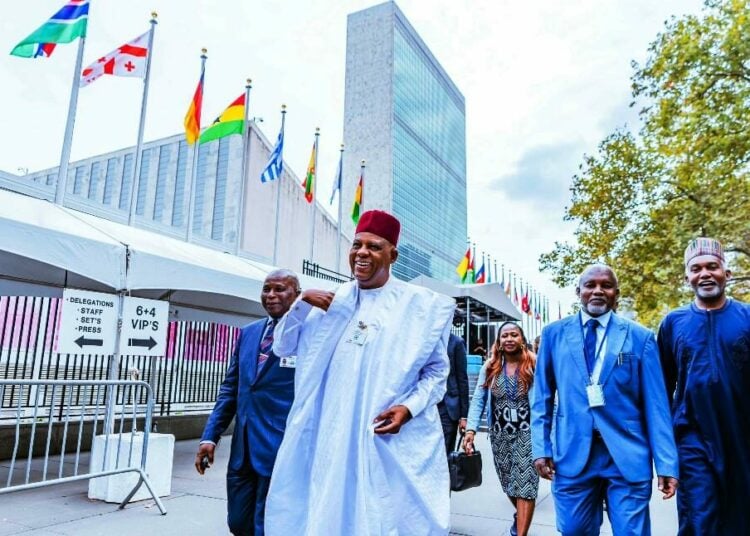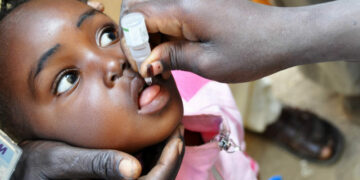At the 80th session of the United Nations General Assembly, President Bola Tinubu delivered a message that was as blunt as it was timely: reform or risk irrelevance.
Speaking through Vice President Kashim Shettima, he articulated a vision of a multilateral order that reflects the realities of the 21st century rather than clinging to outdated structures and diplomatic platitudes.
The UN has been content with words that do not match action for too long. As the President rightly observed, that credibility gap threatens to render the global body inconsequential in shaping the most pressing challenges of our time.
President Tinubu’s address was notable for its clarity and courage. At a forum where leaders often hide behind careful diplomatic phrasing, he chose to confront uncomfortable truths. The Middle East crisis remains unresolved after decades of debate in those same halls.
Nuclear disarmament, the proliferation of small arms, and Security Council reform continue to languish. Meanwhile, conflicts rage, poverty deepens, and the gulf between rhetoric and results grows wider. It is against this background that Nigeria has made its strongest case yet for a permanent seat on the UN Security Council.
The demand is neither new nor misplaced. Nigeria is Africa’s most populous nation, projected to become the third largest in the world. It is a regional power, a significant contributor to peacekeeping operations, and home to one of the earth’s youngest and most dynamic populations.
In the opinion of this newspaper, to exclude such a country from permanent representation at the world’s highest decision-making table is to perpetuate an injustice that undermines both fairness and effectiveness.
A Council that still mirrors the geopolitical balance of 1945 cannot be expected to manage the crises of 2025. Tinubu is correct: the UN will recover its relevance only when it reflects the world as it is, not as it was.
Beyond representation, the President’s speech addressed another fault line in global governance: the financial straitjacket imposed on developing nations. Sovereign debt has become a modern chain, keeping entire continents locked in cycles of poverty and dependency.
Tinubu’s proposal for an international financial court to adjudicate sovereign debt is as radical as it is necessary. Just as the International Court of Justice provides a forum for disputes between states, so too should the world create a mechanism that prevents developing nations from being crushed by unsustainable debt burdens. As he stressed, debt relief must not be seen as charity but as an investment in global peace and prosperity.
The argument gains weight when situated in Africa’s unique role in the emerging global economy. With its abundance of strategic minerals, Africa holds the keys to future technologies — from electric batteries to renewable energy infrastructure.
Tinubu insisted that African nations must not repeat the historic mistake of exporting raw materials only to import finished products at exorbitant cost. Fair partnerships, local processing, and job creation are essential if natural resources are to serve as engines of development rather than sources of instability.
Again, the President was unflinching: When producer nations are denied fair benefits, inequality and tension fester.
Equally striking was the President’s treatment of security and extremism. Having endured decades of terrorism and insurgency, Nigeria understands the limits of military solutions.
Yet, the President was candid about Nigeria’s internal struggles. The economic reforms undertaken under his administration, including the removal of subsidies and the liberalisation of currency controls, have imposed real hardship on citizens.
But he presented them as necessary steps toward building a more resilient and productive economy. By trusting in the ingenuity of the Nigerian people and the corrective power of markets, he argued, the nation is laying the foundation for long-term prosperity.
Whether Nigerians at home feel the same optimism in the face of current pain remains a matter of debate. But Nigeria’s resolve has symbolic power as a model for other developing nations navigating similar transitions.
As a newspaper, we welcome President Tinubu’s forthrightness at the UNGA. Too often, African leaders use the platform for platitudes or retreat into defensive postures. Tinubu’s intervention was instead assertive, demanding fairness and proposing solutions that, if pursued, could recalibrate the global order in ways that benefit not just Nigeria or Africa, but humanity as a whole.
Still, words must lead to action. Nigeria’s bid for a permanent Security Council seat must be backed by sustained diplomacy, coalition-building within the African Union, and alignment with other reform-minded states.
Advocacy for Africa’s mineral wealth must be matched by domestic policies that ensure transparency, local beneficiation, and the protection of communities from exploitation. Nigeria must invest heavily in the digital sphere in education, infrastructure, and regulatory systems that prepare its youth to compete and innovate.
The stakes could not be higher. As Tinubu warned, a United Nations that fails to reform will, indeed, lose relevance.
The proliferation of alternative groupings — from the G20 to BRICS and other regional blocs — already signals that the centre of gravity is shifting. For Nigeria, the opportunity lies in ensuring that Africa is not left behind in this transition, but positioned at the heart of new global arrangements.
Nigeria has spoken with clarity. The world would do well to listen.





